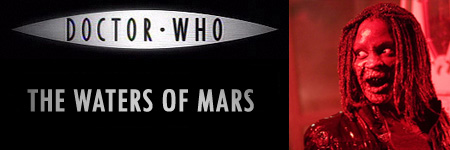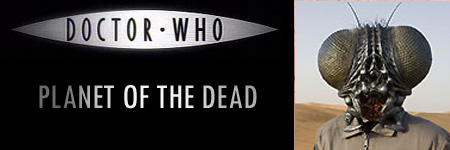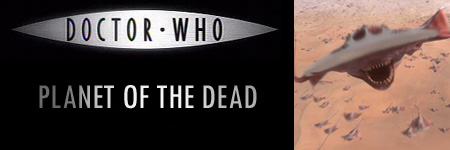The Wilf at the Door
Tuesday, January 5th, 2010
Reviewers of Logopolis and Season Eighteen in general have often fallen back on that word used in The DisContinuity Guide to describe the same story – funereal. That a whole season could be seen to encompass the theme of entropy and inevitable decay is taken as a truism these days, and to hang with the question of whether it awarded (or in the language of the Tenth Doctor “rewarded”) its protagonist a hero’s death. The End of Time and by some small extension the Tenth Doctor’s final year draws some neat comparisons with this, and yet with The End of Time being not only the end for Tennant but also Davies, Collinson and Gardner, the sense of this story being a metatextual finale has loaded the two-parter with weighty significance. There the similarities falter, because with the handing over of the TARDIS keys to Smith, Moffat, Wenger and Willis the anticipation of a new series and new everything has been greater than John Nathan-Turner merely changing his lead and script editor (an oversimplification, sorry, but you get my meaning). Investment in the last hours of Tennant’s tenure was amped up to incredible levels, with the staggered ‘gap year’ and numerous cameos, TV idents and animated specials further loading the significance onto arguably the most hotly anticipated regeneration to date.
Reading the updated edition ofThe Writer’s Tale it’s very much apparent how much was up in the air leading up to the 2009 specials. While the Sarah Jane Adventures were cruising along in assured hands the proposed third series of Torchwood very nearly collapsed, and having farmed out the specials to other writers and built the finale around virtually one single scene it appears that RTD’s well was dry. A desperate situation to be in with the aforementioned investment building. Perhaps that’s why so much of Part One is spent gathering together the various strands – the return of the Master, the Doctor returning to Earth, the growing threat that will pull both together to face… what? We don’t really know until Part Two. I was immensely frustrated with this first half, I certainly had a lot riding on Tennant’s last story, to my surprise. For five years the tricks and sleights that RTD was able to pull off (mostly) writing in the ‘now’, leaving plotholes open and only filling in the background with the lightest of touches – worked, because for the most part the end wasn’t in sight. We didn’t think we needed to know that much about the Time War, as tantalising as it seemed, or whether the Master was really dead at the end of Last of the Time Lords, or what the Doctor meant about being truly alone or whether Rose would return (…) Having an end to all that and, as predicted by many, no clear indication that Steven Moffat intends to continue those stories forces the whole Davies Era into sharp focus. New Who is now composed of story arcs, for better or worse, and the greatest investment of fans in The End of Time was surely that of all season closers this would be the one that wrapped the story up as neatly as necessary and possible. Did it happen? Well, Mostly. But it took over an hour of building up new storylines to do this, seeding the conclusion with supporting characters – some practical (the Vinvocci), some indulgent (the Silver Cloak – a lovely idea but narratively pointless), some little more than grease for the wheels (the Naismiths). And that’s without mentioning the Woman in White who will likely remain a figure of fan debate for ever more. Thank God then for Bernard Cribbens’ Wilf, the kernel of the story.
Between an insane Master, a remote and self-absorbed Doctor and a ruthless Lord President this old soldier is the glue of the story, a stoic core orbited by men who will not accept their time has passed. Having Wilf as de facto companion is simply the cleverest and most sensible thing Russell T Davies did for The End of Time because of the states he put the aforementioned Time Lords. Queen Bess and Ood Sphere prologue Doctor notwithstanding this is a story with the Doctor in a torpor comparable to his Fourth incarnation’s last day. The end is nigh, and Death – seen palpably as the Tenth Doctor’s death rather than a renewal this time, has his scent. He is out of ideas. Where he shines are the moments with Wilf, where the action must be slowed (in the café in Part One, aboard the Vinvocci ship in Part Two) and Murray Gold is dispatched for a coffee before the booming and bombast return. With all companions previous spoken for it is fitting that Wilf is the ear to the Doctor, two old men comforting each other, bolstering one another (“I would be proud to have you as my dad”) and if ever it needed saying, speaking much the same language.
I love Wilf, I love his undying affection for the Doctor, his natural reaction to the TARDIS (“I thought it’d be cleaner”), and the way he makes me cry, so it was a perfect moment that his part in the Doctor’s demise (I only saw it coming when he entered the booth) was treated with the same quiet gravity that their earlier dialogue had shared. Beautiful. The rest of the story? Disposable, which is a shame. The Time Lords return for long enough to be a fly in the ointment due to a technical loophole that simply didn’t need to be so complicated. Likewise, Donna’s appearance was a mis-step, a cheat of a cliffhanger (couldn’t she just have gone snorkeling again?) and like Lucy Saxon, window dressing in an already packed story. Which leaves John Simm’s Master, as barking as Crufts and as hyperactive (and annoying) as in The Sound of Drums, yet granted with a heroic send-off and character arc resolution (“All My Life!!”) that I hadn’t seen coming and found highly rewarding for a character I’ve never warmed to. With his phantom skull recalling The Deadly Assassin in his final(?) moments, I’d be immensely satisfied if this was the last we saw of him.
And so to the regeneration and coda, both of which have been subjected to intense scrutiny. “I don’t want to go” is a loaded phrase, impossible to detach from its creator and performer – I can’t hear it as anything else than self-indulgence, but for me the Tenth Doctor had for twelve months been a man after his time. At least I’ll say this – it wasn’t from my chair that the repeated cries of “just get it over with!” were coming. The Tenth Doctor’s protracted regeneration and revisiting past acquaintances could have been trimmed too – for the most part these are stories that had already been resolved elsewhere (Mickey and Martha, and particularly Sarah Jane who has now been farewelled three times by this Doctor) or remain problematic (Jack). Donna’s farewell is fittingly really Wilf’s, disingenuous to say yet another quiet scene for the reaction it provoked in me, but there it is. By far the most important, and the most restrained is that of Rose Tyler – God bless Russell T Davies’ self-control in scripting this scene, for leaving one conclusion untouched (better late than never), and deservedly revisiting happier times and places. In times to come I believe I could just begin watching The End of Time at the beginning of Part Two and have done with the over-stuffed lead-up, not so much a ‘reward’ as voiced by the Doctor for services rendered, but as a single installment almost perfect.
And then… renewal, the destruction of the coral TARDIS console (I never warmed to it, especially the tatty foam rubber), and the arrival of Matt Smith as scripted by Moffat. The verdict on the new man? Too early to tell at the time, more on this later, but even at the time the sense of change and newness, despite a distressed suit and flaming interior, was there. Onward and upward.



